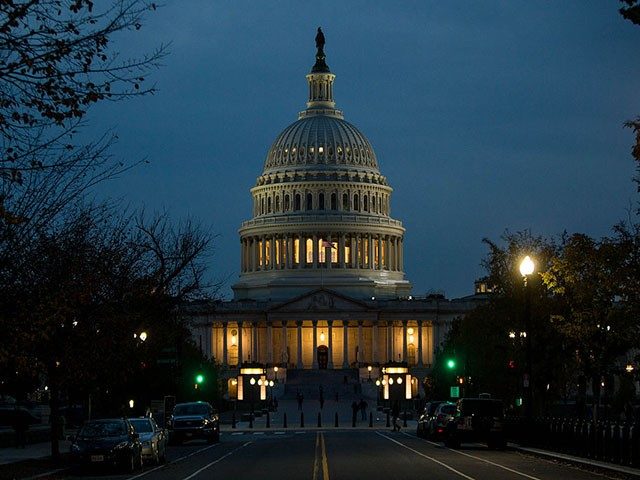It was never even close. Despite suspending the rules and therefore requiring two-thirds support for passage, the Republican-led House easily passed a bipartisan tax bill extending much of the Trump tax cuts despite concern from conservatives that the rushed bill includes handouts to illegal aliens.
The 357-70 vote means the bill is headed for the Senate, then likely President Joe Biden’s desk.
House Speaker Mike Johnson (R-LA) brought the bill — unveiled in its final form just days before the vote — to the floor Wednesday night only hours after announcing definitively that the House would vote on the bill, giving lawmakers little time to review the bill after returning to Washington Monday night.
By speeding the bill through, Republican leadership robbed the conservative opposition of time to mobilize. Ultimately, the majority of the bill’s provisions enjoyed broad Republican support, and 169 Republicans voted for passage.

Speaker of the House Mike Johnson (R-LA) speaks at a press conference at the U.S. Capitol on December 12, 2023, in Washington, DC. (Kevin Dietsch/Getty Images)
But conservatives directed their ire to an expansion of the Child Tax Credit without language requiring the parent to have a Social Security number. They argued that, with migrant encounters at the border at record highs under President Joe Biden, the expansion would serve as an additional, powerful migration pull without additional protections included.
Rep. Scott Perry (R-PA) called the bill, “a huge expansion of welfare to illegal foreign nationals” that “hollows out the working class in favor of tax breaks for corporations that are selling out America.”
Rep. Chip Roy (R-TX), a member of the powerful Rules Committee that ordinarily considers legislation before it hits the floor but was circumvented by suspension of the rules, said lawmakers desiring to ensure tax credits only go to American citizens were working to find a solution “palatable” to both sides.
That compromise may have been impossible to reach. Yet by suspending the rules, Republican leadership sidestepped the efforts.
Roy took to the House floor before the vote to say the bill would “continue to expand the welfare state … in a way in which it entices people to be in the United States illegally, benefit from being here illegally, and do so in a time when we have a heightened level of illegal traffic in the United States.”
“[The Child Tax Credit] is also available to parents who are here in this country ILLEGALLY…we think that's a problem.” pic.twitter.com/iAmB6xjIcI
— Rep. Chip Roy Press Office (@RepChipRoy) January 31, 2024
He continued, “300,000 people crossing the border in December, millions who have crossed under this president, and we’re now, in the middle of that crisis, going to continue to fuel the fire.”
A group of moderate Republicans from high-tax states opposed the legislation over the state and local tax (SALT) deduction cap. Those members, led by a group from New York, received assurances from Speaker Johnson to receive a stand-alone vote on a bill assuaging their concerns.
Wednesday night, the Rules Committee put out a notice for an emergency meeting — meaning the notification violated committee rules to post bills 72 hours in advance — for consideration of a SALT bill supported by the New York group as well as a resolution denouncing Biden’s energy policies.
The Rules Committee will meet tomorrow at 8:00 AM EST on the following emergency measures:
▶️H.R. 7160 – SALT Marriage Penalty Elimination Act
▶️H. Res. 987 – Denouncing the harmful, anti-American energy policies of the Biden administration, and for other purposes— House Rules Committee (@RulesReps) February 1, 2024
The SALT legislation’s prospects remain murky, although it appears the bill will get its day before lawmakers. There have been no signs of an upcoming stand-alone vote to shore up the integrity of the tax credit program.
Opposition to the tax bill centered around not only policy but politics as well. As details of the bill first emerged, the Wall Street Journal editorial board said the Republican Party was giving “the left a major policy victory on the child tax credit in return for tax breaks to please big business.”
Richard Stern, Director of the Heritage Foundation’s Herman Center for the Federal Budget and a former budget staffer to Johnson, told Breitbart News, “most of the bill is an increase in spending and subsidies, not tax relief. 91.5% of what is being labeled as ‘middle class tax cuts’ are actually going to a dramatic expansion of the welfare state.”
He called the bill “a Trojan horse to expand welfare programs, including those that go to illegal aliens.”
Concerns over corporate handouts were not limited to conservative circles. In addition to the 47 Republicans, 23 Democrats voted against the bill, primarily out of concerns that the bill provided disproportionate tax cuts to corporations.
Undoubtedly, the bill included much for Republicans to celebrate, including the restoration of expired provisions in the 2017 Trump tax cuts, the Tax Cuts and Jobs Act. Way and Means Chairman Jason Smith (R-MO) said the bill “continues the important work Republicans began under President Trump by locking in pro-growth, pro-worker, and pro-American tax policies that spur economic prosperity.”
The Tax Relief for American Families & Workers Act locks in $600 billion in pro-growth, pro-worker, and pro-American tax policies.
Passing this bill will restore key provisions of the 2017 Trump Tax Cuts. pic.twitter.com/kLBbYeNAYS
— Rep. Jason Smith (@RepJasonSmith) January 31, 2024
But in addition to concerns with the expansion of tax credits available to illegal aliens, process concerns remain. The House typically suspends the rules to speedily pass non-controversial or low-profile bills, like those renaming post offices. But in fewer than 100 days with the gavel, Johnson has now suspended the rules to pass three significant pieces of legislation.
Earlier in January, Johnson passed a continuing resolution under suspension that extended spending levels set in a December 2022 lame-duck congressional session by Speaker Nancy Pelosi (D-CA) and Minority Leader Chuck Schumer (D-NY).
While that bill — to little surprise — enjoyed overwhelming Democrat support, Johnson secured majority Republican support of the bill by only one vote. Breitbart News learned that Johnson secured the majority only after a last-minute switch to yes.
In December, Johnson suspended the rules to pass a defense authorization bill that had been watered down by the Senate, removing multiple provisions in a House-passed bill, including those to fight DEI programs in the Department of Defense. It also included an extension of the controversial Foreign Intelligence Surveillance Act (FISA).
The defense authorization bill passed despite a majority of Republicans opposing it, seemingly in violation of House Republican Conference rules adopted at the beginning of the Congress.
The tax bill enjoyed significantly more support from Republicans than those two bills.
Republican opposition to the tax bill on its merits — and persisting anger over yet another use (or abuse) of suspension of the rules — did little to halt its passage. But battles are quickly approaching over government spending in March and FISA reauthorization in April before an election year legislative lull. And with arrows in their quiver to force a shakeup — as now former-Speaker Kevin McCarthy (R-CA) can attest — restless Republicans frustrated at the continuation of the status quo may choose these next battles to make their stand.
Bradley Jaye is a Capitol Hill Correspondent for Breitbart News. Follow him on X/Twitter at @BradleyAJaye.

COMMENTS
Please let us know if you're having issues with commenting.